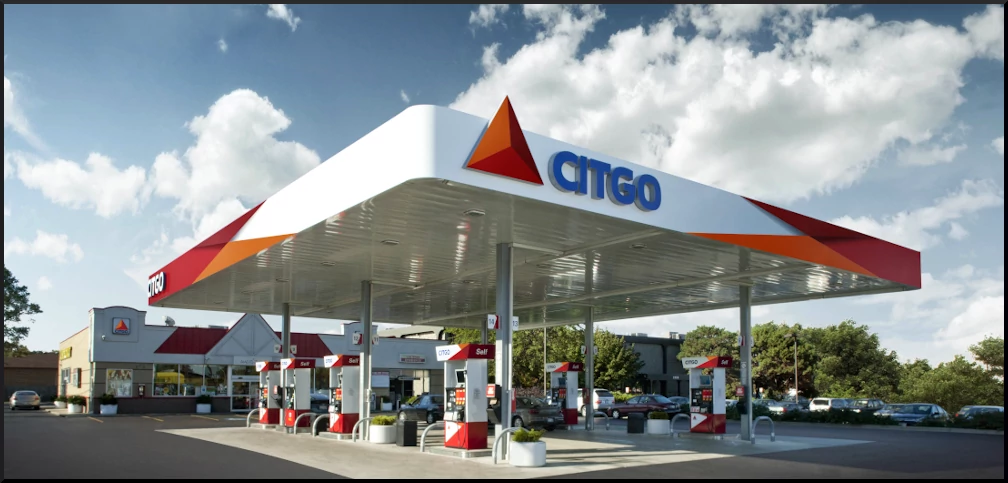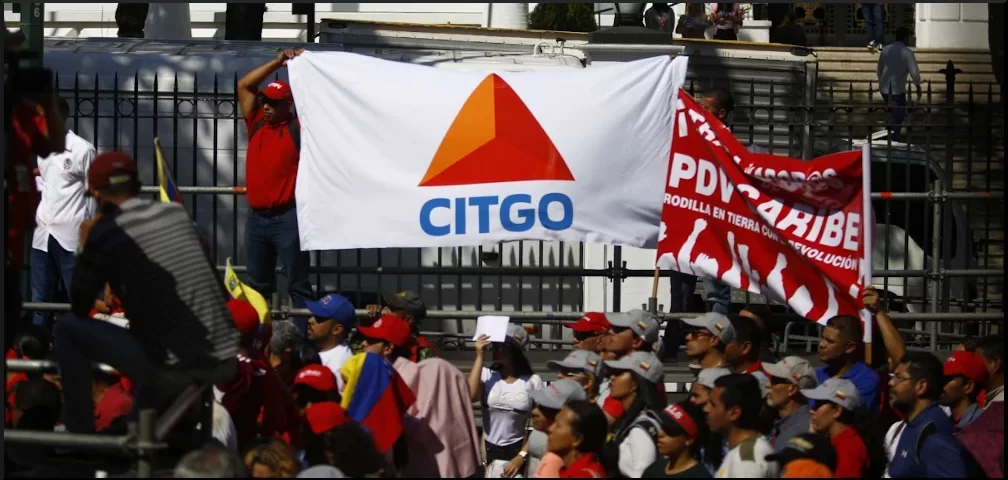by Geraldina Colotti, published on Resumen English, May 6, 2023
There is much confusion about the selling off of Citgo; this article clarifies how this new form of lawfare is an escalation of the empire’s economic war against revolutionary Venezuela . – editorial/Resumen
Venezuela is mobilizing against the U.S. decision to auction the shares of the parent company of the refinery Citgo Petroleum Corp, PDV Holding, the main asset of the Bolivarian Republic abroad. A way for the company to be seized by creditors, after “negotiations” with those whom the US recognizes as “proxies”: the gang of the self-proclaimed Juan Guaidó or its derivatives, who had been allowed to access funds blocked by the illegal unilateral coercive measures, imposed on Venezuela.
The Treasury Department had so far “protected” Citgo from creditors, but now, to tighten the noose even more on the Bolivarian revolution, the hawks in Washington have once again blocked the possibility of a change of course, proposed by the International Conference in Bogota, which had Venezuela as its theme.
At that meeting, the 20 delegations, representing three continents, had agreed on a series of “recommendations”, to be presented to both the Bolivarian government and that part of the opposition which is in the Unitary Platform, in order to renew the dialogue interrupted in Mexico. At the center, the end of the “sanctions”, a priority condition set by the Bolivarian government.
The conference, preceded by a round of international contacts by Colombian President Gustavo Petro, could not have been organized without the approval of the Biden administration. However, as a sign of the internal conflict and confusion that reigns in U.S. foreign policy, the show of the former self-proclaimed, Juan Guaidó, was allowed. A character disowned by his own cronies, whose strings, however, still need to be pulled to the end.
After crossing the border “on foot”, as he himself declared, Guaidó attended the conference in Colombia, uninvited, and was then accompanied to the airport, where he was taken by his gringo godfathers to Miami. The former deputy protested for being expelled from Colombia.
In truth – denounced President Maduro – his objective was “to help coordinate the theft of the Citgo company”, formalized with General License 42, issued by the Office of Foreign Assets Control (OFAC) which authorizes a sector of the extreme right wing to deal with the debts of the Bolivarian Republic and of the state-owned company Petróleos de Venezuela (PDVSA).
Maduro explained that, with a document dated April 7, the Biden administration delivered “all the assets of the Citgo company, all of Venezuela’s money abroad, to a group of opposition political parties, belonging to the Unitary Platform, so that they can sell them, to negotiate, to do and undo”. Washington -reiterated the President- “is carrying out one of the greatest plundering that has ever been done against any country in the world”, and accused Biden of “stabbing the Bogotá conference in the back”, going where “not even Trump had dared”. In fact, the timing of the decision indicates that everything was already prepared before the Petro Conference, which ended on April 26.
A provocation to which the Bolivarian government has responded firmly, both internationally and domestically. During a meeting of the Economic and Social Council of the United Nations, in connection with UN Goal 16, which seeks to “promote just, peaceful and inclusive societies”, Venezuela’s alternate permanent representative to the UN, Joaquín Pérez Ayestarán, denounced the “sanctions” imposed by the US and the theft of Citgo.
The Bolivarian Government “will not recognize any negotiation or payment agreement with any creditor that is not led by the Venezuelan State”, said the Vice-President, Delcy Rodríguez, when explaining the mechanism by which the “illegal expropriation” of the Venezuelan company Citgo Petroleum Corporation is being carried out. The decision, which constitutes a violation of public and private international law, as well as Venezuelan law, authorizes members of the defunct National Assembly of 2015 to carry out transactions to negotiate the debt of the national government, PDVSA or any institution in which the republic owns with a shareholding equal to or greater than 50%.
“There is no law on the planet that OFAC license 42 has not violated,” said Rodríguez from the Miraflores Palace, accompanied by Foreign Minister Yván Gil and Oil Minister Pedro Tellechea. The Vice President recalled the programs of this decision, anticipated by another OFAC provision, issued on January 9, 2023, which allowed the National Assembly of 2015, “the power to deal with any person, institution or company in the United States”. And, in fact, on March 15, former Deputy Dinora Figuera, of the Primero Justicia party, met with officials of the State Department “to establish the staging of this flagrant and vulgar robbery of the century”.
Rodríguez denounced that Washington, assuming the role of victim, intends to ignore the decision of the Delaware Court of Justice, which allows Venezuelan debt holders to seize the company Citgo. Among them are: ConocoPhillips, Crystallex, Rusoro, Gold Reserve, Gold Reserve, Koch Minerals , Owens Illinois, ACL1 Investments, Northrop Grumman Systems. Against OFAC General License 42 – said Rodríguez – “according to instructions from the head of State, Nicolás Maduro, the National Government will exercise all actions in defense of our interests, our rights and the patrimony of Venezuelans”.
Citgo, headquartered in Houston, is the seventh largest refinery in the United States. It has plants in Louisiana, Illinois and Texas and is valued at more than $13 billion. Robert Pincus, a court-appointed official who met with the Treasury and Justice Departments, urged the court to hurry “to take advantage of Citgo’s recent financial and operational performance and the current state of the refining industry.”
Canadian miner Crystallex International is asking PDV Holding for US$970 million. Other creditors with at least $2.6 billion in claims against Venezuela have received conditional approval to join the lawsuit. Pincus proposed to begin the sale process on September 5 with the highest bid received by the court until June 2024. The court entered into an agreement with investment banker Evercore to gauge market demand and conduct the sale.

Citgo – said Maduro during the May 1st march – generates annual revenues in excess of 1 billion dollars and has more than 10,000 gas stations in the United States. Resources which belong to the people and which, had they been available, would have been destined to increase the income of the workers. For this reason, the Venezuelan parliament, the legitimate one, approved, in initial discussion, the bill for the protection of assets abroad.
“We are going to apply the Extinction of Ownership Law to all those involved in this robbery of the republic”, said the president of the National Assembly (NA), Jorge Rodríguez, presiding over the parliamentary session, which will continue this week. The Law of Extinction of Domain provides for the possibility of seizure and redistribution of assets resulting from corruption. A crime considered “treason to the Fatherland”, which is being prosecuted on a large scale after the discovery of a gigantic network that has stolen public money for about 23 billion dollars.
The legitimate President of the National Assembly has urged its application to 72 former deputies usurping public functions. The State will not recognize any transaction involving Venezuelan assets. This is provided for in Article 138 of the Bolivarian Constitution, according to which “any usurped authority is without effect and its acts are null and void”. With the usual polemic vis, Jorge Rodriguez demanded the political leader, Henrique Capriles Radonski, to order Dinora Figuera, a militant of his party, “to return all the money she stole”.
The State Department has in fact allowed the extinct National Assembly of 2015 – which this year, after having withdrawn confidence from Guaidó, continued the electoral farce, entrusting the “management” to a triumvirate of fugitives from justice, led by Figuera -, the bank account of some 347 million. Venezuelan money frozen in US banks, disbursed to the opposition since 2019, when Juan Guaidó self-proclaimed himself “interim president”. However, since the removal of his imperial invention, in January 2023, the new “management” of the illegal AN had not been able to access the loot, due to the “directive vacuum”.
The problem was making the gang nervous, and they were pressuring their American godfathers to grant them access to “protected” resources abroad. And this lucrative signature assignment perhaps also explains Guaidó’s flight to Miami, perhaps to negotiate a good “compensation”. They gave him a sugar gift by making him appear at a public rally, during which he thanked “the Republican senators for their commitment to democracy”.
In that context, the former governor of Florida, Rick Scott, introduced him as “the presidential candidate of Voluntad Popular in the primaries”, and added: “I hope that all my colleagues and the White House will meet with the brave leaders of the opposition and align themselves with the Venezuelan people, to continue to be their voice against the nefarious Maduro regime”. A group of activists protested against Guaidó with shouts of “corrupt” and “murderer.” He stammered, “Let them go to Venezuela to disrupt Nicolás Maduro, to see what happens to them.” And, as the police led the protesters away, he continued to brag about the wonders of U.S. “democracy.”
“The United States confuses the Bolivarian government’s willingness to dialogue with weakness,” said the Vice Minister of Anti-Blockade Policies, William Castillo, during the program “A Pulso”. Illustrating the research work carried out by the Observatory of Sanctions, Castillo underlined how the fluctuating attitude of the US is due to the distorted vision given by the Venezuelan opposition, making it believe that “Maduro is falling, and sanctions must be increased”.
A communiqué from the Bolivarian Alliance for the Peoples of Our America-People’s Trade Treaty (ALBA-TCP) also called the State Department’s decision to “expropriate Citgo through the illegitimate General License No. 42”, a new aggression against the people and government of Venezuela, a “consequence of the unilateral coercive measures imposed by the government of the United States, which attempt against the sovereignty of that country”. Therefore, the Bolivarian Alliance made a call to the international community to demand the cessation of the “sanctions”, and expressed its support to “all legal measures undertaken by the Venezuelan government for the protection of its assets”.
During his visit to Spain, the Colombian president, Gustavo Petro, has once again denounced the effects of the “sanctions” on the Venezuelan people. After recalling that Colombia and Venezuela “are practically the same people”, Petro said that, due to the “sanctions”, Venezuelan society has gone from “living well and having access to the best whiskey in the world, to not having a plate to eat on. And this -he added- not the opposition to Maduro, is the reason why many emigrate”. Petro also confirmed Washington’s plans to invade Venezuela, discussed with his predecessor, which provoked an angry reaction from members of Duque’s former government.
But, this May, Venezuela remembered the third anniversary of Operation Gideon, when a group of mercenaries sent by the United States and trained by Colombia attempted to invade Venezuela with a plan to kill Maduro and the entire Chavista high command. During a public act, the Vice President of the PSUV, Diosdado Cabello, paid tribute to the bravery of the people who stopped the invasion: “Revolutionary strength and unity -said the Captain- are the greatest guarantee of victory of the Bolivarian revolution”.
One of those mercenaries, a former Marine, could be the object of an exchange with the Venezuelan diplomat Alex Saab, kidnapped by the United States, whose health is deteriorating day by day. The Venezuelan government also reiterated it on the occasion of the Bogota Conference. But the United States has responded with this new act of imperial arrogance.
*Featured Image: While Washington continues to push the false narrative that Venezuela needs “free elections,” the State Department has greenlighted the sale of CITGO. (Bloomberg)
Source: Resumen Latinoamericano – Buenos Aires
